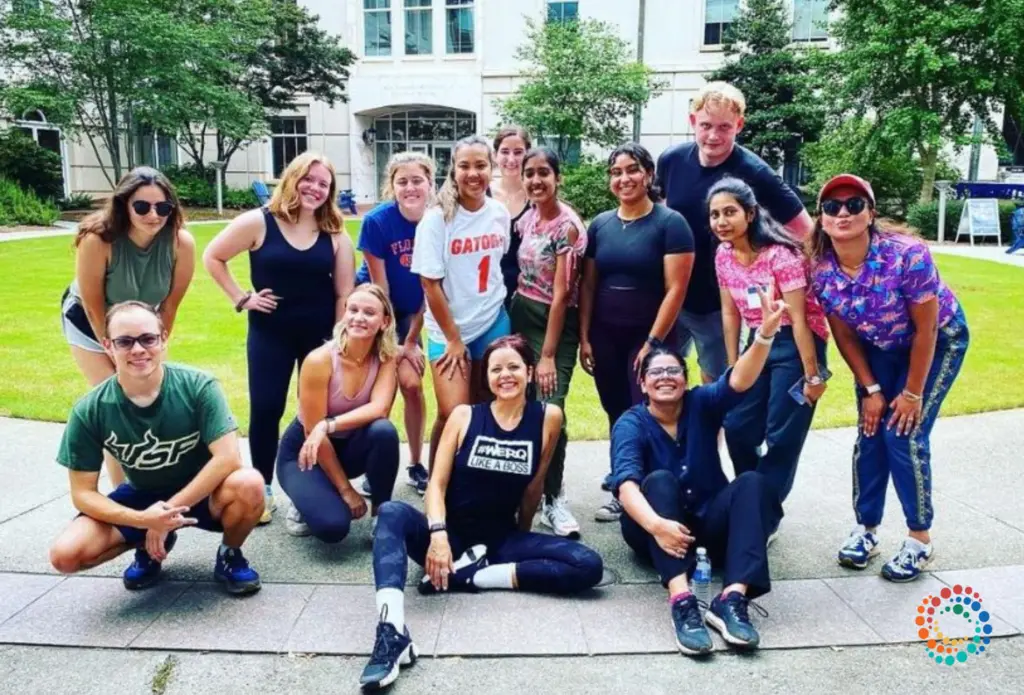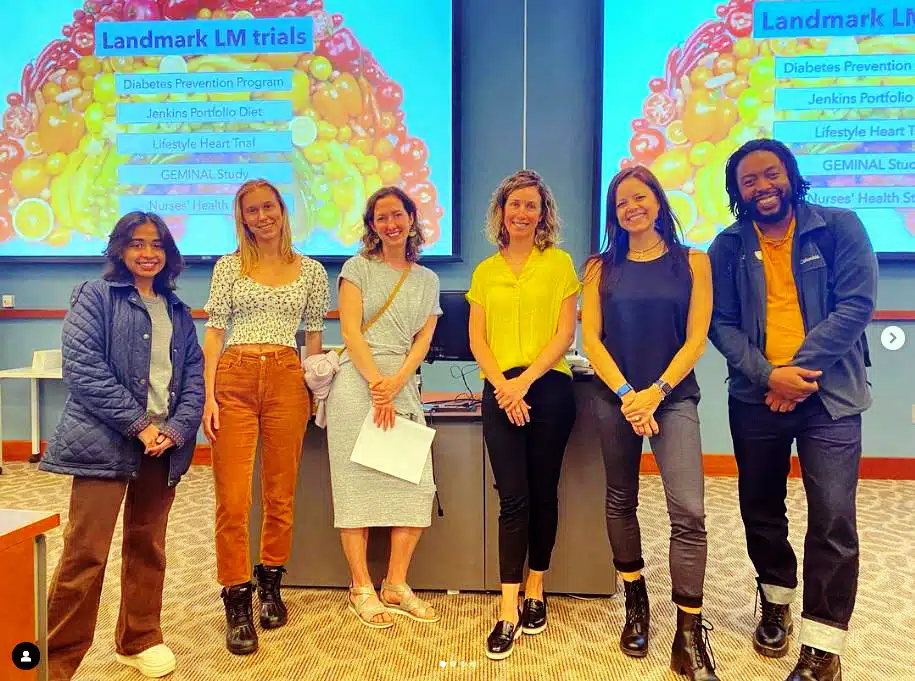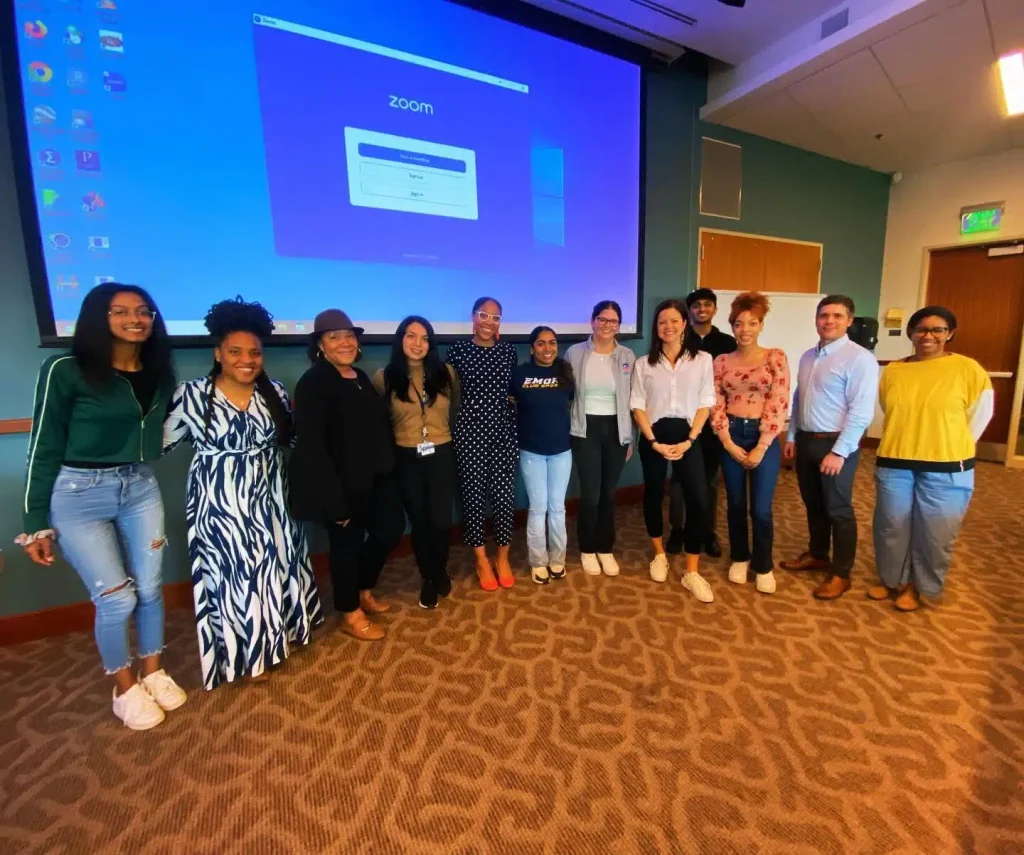The Lifestyle Medicine Interest Group (LMIG) founded in 2019 at Emory University is just one example of how creating space for people with similar interests can ignite a culture of healthy lifestyle behaviors and learning.
Alex Branch
ACLM Director of Communications
August 1, 2024

The inaugural meeting of the Emory University Lifestyle Medicine Interest Group (LMIG) was held in December 2019 inside a conference room on campus. Krystyna Morgan, founder of the group, and a few others arranged tables and chairs and even recruited the university hospital’s executive chef to prepare a beautiful plant-based food spread.
Then she hoped people would show up.
They did—60 university healthcare professionals, such as doctors and nurses, and students from the schools of medicine, public health and even business, all interested in learning about the growing field of lifestyle medicine. Many others joined virtually.
“I was shocked. I did NOT expect so many people,” said Morgan, who at the time worked as an outreach liaison for Emory Healthcare while also studying public health. “I realized there were so many other health professionals and students who shared an interest in learning about lifestyle medicine and incorporating it into clinical care. We just didn’t realize it until we created this space for us all to come together.”
Five years later, the Emory LMIG has introduced lifestyle medicine to more than 2,000 students, faculty members and health professionals, more than 750 of whom have registered for ACLM’s complimentary “Lifestyle Medicine and Food as Medicine Essentials” CME/CE course. LMIGs are having similar impacts at a rapidly growing number of medical schools, residencies and other health professional training programs nationwide.
In fact, since current ACLM President Beth Frates, MD, FACLM, DipABLM, helped students start the first LMIG at Harvard Medical School in 2008, the number of LMIGs nationwide has surpassed 165, including 95 at medical schools (nearly half of all U.S. medical schools). LMIGs provide a flexible, no-cost structure designed to engage students during their formal training to learn more about the practice of lifestyle medicine. ACLM provides support and resources to facilitate the student-led groups.
To help students interested in starting LMIGs at their institutions, ACLM asked Morgan about the process of founding an LMIG and what advice she has for others.

What inspired you to start the LMIG at Emory?
In 2016, I switched to a fully plant-based diet and became interested in the science of nutrition. I joined ACLM in 2017 and gradually started finding people who shared my interest on campus, such as Sharon Bergquist, MD, who founded the Emory Lifestyle Medicine & Wellness program, and Jon Bonnet, MD, MPH, CAQSM, FAAFP, FACLM, DipABLM, who encouraged me to apply for ACLM’s Donald A. Pegg Student Leadership Award.
What effect did the Pegg Award have?
It was huge! The Pegg Award was established in honor of Dr. Frates’ father and provides recipients seed money to start an LMIG and to attend ACLM’s annual conference. I was one of four winners in 2019. My experience at the conference was mind-blowing. Dr. Dean Ornish and Dr. John McDougall were there. I knew lifestyle medicine was exactly what I was looking for.
Another great thing about the Pegg Award was that the four winners had reoccurring calls where we shared ideas and discussed our plans. Dr. Frates joining those calls was such a valuable resource to us all. It was wonderful to have that support.
What kind of events did the Emory LMIG plan?
Our first event in 2019 was Dr. Bonnet’s introduction to lifestyle medicine. It was a big hit. Then COVID arrived and we transitioned to virtual events. We organized monthly webinars on a wide range of subjects—exercise as medicine, mindfulness and compassion, the ‘how’ and ‘why’ of plant-based nutrition—that drew a lot of interest. For example, 100 people tuned in for the webinar on exercise as medicine.
Once we could meet in person again, we added hikes and plant-based potlucks, group fitness classes and cooking demonstrations. We are very fortunate to have a great teaching kitchen on campus. We did a plant-based sushi rolling demonstration that was so popular we’ve made plans to do it again. We try to make our activities experiential, fun and creative.
How has student participation evolved?
At first, more of our participants were healthcare professionals. But over time, the students came on board. LMIGs are student-led, so healthy student participation is really important. When I graduated, we recruited a full student board to continue leading the LMIG. Today, we have LMIG student leaders representing chapters at different schools across campus, such as undergraduate, nursing, public health and medicine.
We still have the same weekly or biweekly meetings together but found that having separate school representation improved communication and ensures the right information gets to the right people when they need it. I am still very involved and represent the chapter of healthcare professionals, but our students have taken it and run with it!

Does the LMIG collaborate with others on campus?
It is amazing how much enthusiasm and desire there is from other campus groups to partner with us. For example, we partner with Emory Recreation and Fitness, a student service that operates a gym facility and provides health programming and activities. Our LMIG students lead some fun activities there while the recreation and fitness team help financially support some LMIG events. We partner with the university healthcare system’s health promotion team – Healthy Emory – where we have heavily promoted ACLM’s complimentary “Lifestyle Medicine and Food as Medicine Essentials” CME/CE course. We tell them not only do they earn CME/CE credits, but also valuable, evidence-based health information they can apply to their own lives.
LMIG students even take on special projects, like reviewing food labeling and the availability of plant-based offerings for students, staff and faculty in campus cafeterias. There are many more examples.
It sounds like the LMIG has become a hub for lifestyle medicine on campus.
Exactly! If someone has an interest in a topic related to lifestyle medicine, they usually come to us. We’ve paired students interested in lifestyle medicine-related research or experiential opportunities with professors on campus who can provide them. They probably never would have found each other otherwise. When someone needs an expert in culinary medicine for a food demonstration, or a speaker on mindfulness or exercise, we have a great network of people we can immediately point to.
What brings me great joy is that lifestyle medicine has also now taken root in healthcare implementation at Emory. All of these physicians and other healthcare professionals who connected in the LMIG are coming together and discussing how to grow our lifestyle medicine healthcare service. One physician, Caroline Collins, MD, DipABLM, started incorporating ACLM’s Lifestyle Medicine Residency Curriculum in the preventive and family medicine program this summer. We’ve discussed how to increase the availability of shared medical appointments and fundraising to help cover the cost of education and obtaining certification in lifestyle medicine for our clinicians. It’s really exciting to see the momentum.
Any last words of advice for students interested in starting an LMIG?
ACLM offers a great LMIG toolkit that helps guide students who want to start an interest group. But if a student asked me how to get started, I would say this: start where the interest already is. Find your advocate: smart, passionate people who share your interests. They can be fellow students, healthcare professionals or faculty members. Then create the space so they can all come together.
People will come out of the woodwork. Some have no idea yet they are interested in lifestyle medicine—they may not even know what it is yet. But if you create the space, they’ll find you and realize “Oh, lifestyle medicine is exactly what I was looking for.”